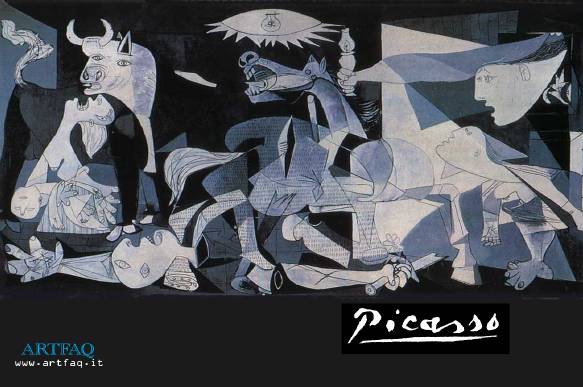Long Live the Glorious Legacy of the Spanish Civil War!
Long Live People's Struggles Against War and Fascism!
70 th Anniversary of the Spanish Civil War 
”The Spanish struggle is the fight of reaction against the people, against freedom. My whole life as an artist has been nothing more than a continuous struggle against reaction and the death of art. How could anybody think for a moment that I could be in agreement with reaction and death? ... In the panel on which I am working, which I shall call Guernica , and in all my recent works of art, I clearly express my abhorrence of the military caste which has sunk Spain in an ocean of pain and death.”
- Pablo Picasso |
July 2006 marks seventy years of the Spanish Civil War (July 1936-April 1939), where revolutionaries from across the world joined the Spanish people in their battle to defend the Spanish Republic against domestic reaction backed by international fascism. That war saw the first ever aerial bombing of Guernica by Nazi Germany, which claimed the lives of 1600 civilians. Pablo Picasso painted his immortal Guernica as a cry of protest against that bombing. It is hardly surprising that in 2003, US Secretary of State Colin Powell had a reproduction of Guernica at the UN covered up, since it formed an ironic and damning backdrop to his Press Conference defending the US war on Iraq !
As Israel continues to bombard Lebanon , and the horrors of the US war and occupation of Iraq are still with us, Guernica and Neruda's call to “come and see the blood on the streets” is more relevant than ever.
I'm Explaining a Few Things
- Pablo Neruda
You are going to ask: and where are the lilacs?
and the poppy-petalled metaphysics?
and the rain repeatedly spattering
its words and drilling them full
of apertures and birds?
I'll tell you all the news.
I lived in a suburb,
a suburb of Madrid , with bells,
and clocks, and trees.
From there you could look out
over Castille's dry face:
a leather ocean.
My house was called
the house of flowers, because in every cranny
geraniums burst: it was
a good-looking house
with its dogs and children.
Remember, Raul?
Eh, Rafel? Federico, do you remember
from under the ground
my balconies on which
the light of June drowned flowers in your mouth?
Brother, my brother!
Everything
loud with big voices, the salt of merchandises,
pile-ups of palpitating bread,
the stalls of my suburb of Arguelles with its statue
like a drained inkwell in a swirl of hake:
oil flowed into spoons,
a deep baying
of feet and hands swelled in the streets,
metres, litres, the sharp
measure of life,
stacked-up fish,
the texture of roofs with a cold sun in which
the weather vane falters,
the fine, frenzied ivory of potatoes,
wave on wave of tomatoes rolling down the sea.
And one morning all that was burning,
one morning the bonfires
leapt out of the earth
devouring human beings —
and from then on fire,
gunpowder from then on,
and from then on blood.
Bandits with planes and Moors,
bandits with finger-rings and duchesses,
bandits with black friars spattering blessings
came through the sky to kill children
and the blood of children ran through the streets
without fuss, like children's blood.
Jackals that the jackals would despise,
stones that the dry thistle would bite on and spit out,
vipers that the vipers would abominate!
Face to face with you I have seen the blood
of Spain tower like a tide
to drown you in one wave
of pride and knives!
Treacherous
generals:
see my dead house,
look at broken Spain :
from every house burning metal flows
instead of flowers,
from every socket of Spain
Spain emerges
and from every dead child a rifle with eyes,
and from every crime bullets are born
which will one day find
the bull's eye of your hearts.
And you'll ask: why doesn't his poetry
speak of dreams and leaves
and the great volcanoes of his native land?
Come and see the blood in the streets.
Come and see
The blood in the streets.
Come and see the blood
In the streets!
